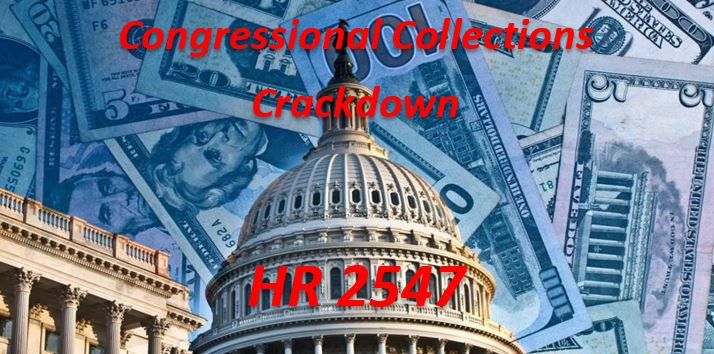
On May 13th, Congress passed California Representative Maxine Waters’ massive eight-part debt collections bill titled “H.R.2547 – Comprehensive Debt Collection Improvement Act” or CDCIA for short.Passing with a vote of 215 to 207, almost completely along party lines with only on Democrat voting nay, HR 2547 will head to a more evenly divided Senate where Majority Leader Chuck Schumer will likely bring it to vote.
Staring back at the beginning of the Pandemic in March of 2020, when many other consumer protection bills were being proposed, Representative Waters had drafted her own six-page proposal to help consumers who had just begun quarantines. The plan, intended to assist the expected many who soon found themselves out of work and with no expected income, sought monthly payments as well as suspension of nearly all consumer and small business debt payments. While many rent, foreclosure and eviction protections did go into effect, most of Waters’ plan did not.
HR 2547, aka; CDCIA, took 8 previously proposed consumer protection bills and consolidated them into one massive consumer protection bill that would affect debt collections and lending in almost every aspect of the industry including the FDCPA, TILA and FCRA. The 8 bills that make up this bill are;
- HR 2540, the “Small Business Fairness Lending Act”
- HR 1491, the “Fair Debt Collection Practices for Servicemembers Act”
- HR 2498, the “Private Loan Disability Discharge Act”
- HR 2537, the “Consumer Protection for Medical Debt Collections Act”
- HR 1657, the “Ending Debt Collection Harassment Act”
- HR 2572, the “Stop Debt Collection Abuse Act”
- HR 2628, the “Debt Collection Practices Harmonization Act”
- HR 2458, the “Non-Judicial Foreclosure Debt Collection Clarification Act”
H.R. 2547 would, among other things, impose several new restrictions on private debt collection. Specifically, title VI would require federal agencies to wait 90 days after a delinquency or default to turn over debt to a private collection agency (PCA).
The “Stop Debt Collection Abuse Act”, aka Title VI, would require collection agencies that collect debt on behalf of the federal government comply with all applicable provisions of the Fair Debt Collection Practices Act (FDCPA). In addition, under the bill amounts charged by those debt collectors may not exceed 10 percent of the amount collected.
The “Small Business Fairness Lending Act” essentially amends the Truth in Lending Act (TILA) to restrict the use of confessions of judgment for small business owners, extending the protections that currently exist in consumer lending.
Representative Ayanna Pressley’s (D-MA) “Ending Debt Collection Harassment Act” would amend the FDCPA to prohibit debt collectors from contacting consumers by email or text messages without the consumer’s consent to be contacted electronically.
The scale and girth of this bill is far too extensive to detail, but if passed, would change not only collections but lending for many years to come. That is of course, “if” it passes, which could be a challenge.
In Senate, the bill will be discussed, debated, and possibly amended before being voted on. Here, it only needs a simple majority vote of 51 out of 100 seats. If it passes the Senate, it will then be referred back to a joint committee of House and Senate members for final revisions before being brought again back to the House and Senate for final votes. After that, the bill would then head to the White House where the President would have ten days to sign or veto it.
That’s still a long way to go and the bulk of the bill could be squashed. Regardless, any one or more of the 8 titles could survive. While it’s survival is not guaranteed, let us not forget the recent 11th circuit decision on the Hunstein vs. v. Preferred Collection and Management Services lingering out there. Even with the improved COVID numbers, loosening of lockdowns and restrictions imposed by the pandemic, the collections and lending industries continue to be under fire from every angle.











Facebook Comments